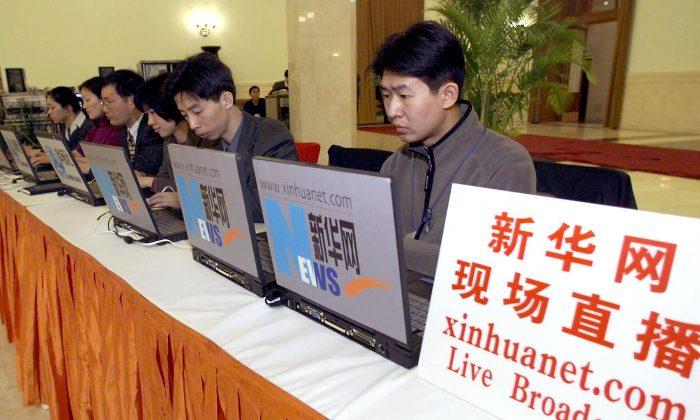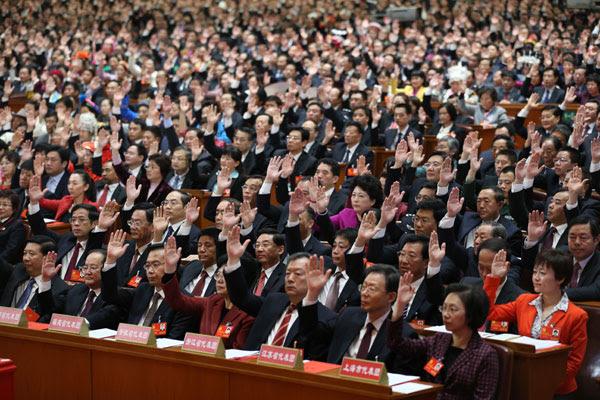This week, a joke compares the Chinese Communist Party to a high-functioning underworld mob, while Internet users dredge up old People’s Daily reporting to show how for Chinese state media, every day is April Fool’s. The difference is that instead of being once a year, in China fooling the public happens “any time, any place, over any issue,” and unlike April Fool’s jokes, the Party “never tells you that you’ve been taken in.”
Joke of the Week
When local business owner Mr. Sun went to pay his monthly protection fee to the mafia boss, right outside he saw a sign saying: “Ideological security must be guaranteed.” After meeting the Don, Mr. Sun was confused: “What does ‘ideological security’ refer to?” The boss replied: “The ideas contained therein are rich indeed. But to put it simply, it’s about making everyone believe that the activities of our mafia are legitimate business.” Mr. Sun was still confused: “But how is that linked with ‘ideological security?’” The boss replied: “It’s straightforward. If all of you buy that ‘ideology’, then we’re secure.” —Facebook
Fooling Professionals
On April 1, Xinhua posted on its official Weibo page: “April Fools’ Day doesn’t correspond with China’s traditional culture and core socialist values… Hopefully everyone won’t believe, create or spread rumors.”
Below is a selection of replies from Chinese Internet users.
“Join the right party and every day is April Fool’s.”
“The post is a good example of unhealthy competition within the same industry.”
“Wow, it’s so rare to see some sense of humour out of Xinhua’s mouth… What? You mean Xinhua is serious?”
“Specifying a single day to fool others, and in the end letting others know how they were fooled—I completely agree that such an amatuer fooling method fails to correspond with China’s socialist values. In China, fooling should be carried out in the same manner as Party mouthpieces: fool people any time, any place, over any issue, and never tell them that they were taken in. Only this deserves to be called a core socialist value.”
The famous lie by the People’s Daily during the Great Leap Forward: that yield
per unit area of rice was over 40,590 pounds.
Best of Social Media
@redfireage: “The United States only took about 300 years to build the most powerful nation out of nothing. On the other hand, China only took several political movements to destroy a 5000-year-old civilization, creating poverty and a cultural desert. The United States constitution was written for its people and nation, while the Chinese Communist Party’s revolution was for its leader and dictatorship.” —Twitter
On controlling speech
Zhang Kangkang: “It seems that there are many different kinds of newspapers, but indeed there is only one. It seems that there are many different voices, but indeed there is only one. It seems that one can have numerous ideas, but indeed only one is allowed in practice. If necessary, they [the Party] will try to transform every human into a single model. They have absolute power to do this, and the regime is like a effective machine specially designed to do it, producing ’slaves’ without a second thought.” —Twitter
Shenzhen’s Odd Ban
In late March, the Shenzhen government suddenly initiated a 100-day movement banning motorcycles, and restricting the use of electric scooters. Over 18,000 bikes were confiscated by police in 10 days, including the impounding of 1,200 courier tricycles and detention of 50 couriers. Violence was reportedly used by police. Couriers who relied on such vehicles for their jobs were forced out of work.
The abrupt, violent and very likely illegal “law enforcement” quickly drew public outrage. An article online told a story of a young man who set upon his own vehicle when chased by police, yelling: “I would rather smash my bike myself than give it to bandits.”
The article also revealed an unconfirmed official document which outlined a series of rewards for police to confiscate vehicles: each tricycle impounded was to be rewarded with 100 yuan ($15.4), each motorcycle with 300 yuan ($46.3), and each scooter 30 yuan ($4.6).
The strange enforcement incident was the subject of heavy attack online. An internet user posted: “[The government] is always incapable of managing the country, but never short of new ways of disturbing civilians.”
Another highly-forwarded remark said: “Why are motorcycles never banned in Taiwan? The answer is that there is a vote behind each motorcycle rider, so no government dares do that. Imagine how many Shenzhen workers who rely on motorcycles or scooters have said ‘I don’t care about politics.’ People will now finally learn that politics is something they can’t ignore.”



